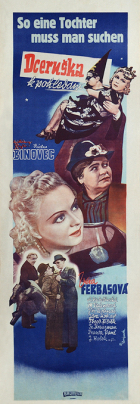Réalisation:
Václav BinovecScénario:
Josef MachPhotographie:
Jaroslav TuzarMusique:
Eman FialaActeurs·trices:
Věra Ferbasová, Jára Kohout, Anna Steimarová, Meda Valentová, Jiří Dohnal, Antonie Nedošinská, František Kreuzmann st., Theodor Pištěk (plus)Résumés(1)
A Czech-American professor, Johnny Novák, discovers from his late father's estate that he is himself a father - of a girl that lives with her mother Helena Strnadová in Prague where Johnny had briefly lived eighteen years earlier. Johnny's father had disapproved of the affair so strongly that he did not forward Helena's letters, only sending money to her aunt for the child's upbringing. Johnny and his friend Jimmy Sládek decide to go and visit Helena and her daughter, and they notify Helena's aunt by telegramme. She turns out to have invented the story of the child in order to compel Johnny to return to Helena. Johnny never knew of the child and Helena's aunt set her up in a costume rental business with the money she received. Both women want to punish Johnny. They enlist the help of an amateur dramatic group who are to play Helena's admirers and the role of Helena's fictive daughter is enthusiastically taken on by Máňa Nováčková. Johnny sends Sládek off on a reconnaissance mission. The latter happens to meet Máňa and they fall in love with each other. The aunt's plan fails, the actors are not convincing, and the aunt's lie is exposed. Johnny and Helena's love flares up again. Jimmy takes his girlfriend Máňa to the United States. (texte officiel du distributeur)
(plus)Critiques (1)
The fourth film of the Czech dream couple Věra Ferbasová and Jiří Dohnal was directed by Václav Binovec. An author whose domain was legionary films, but also experiments of all kinds. In silent film it was he who brought Czech expressionism to life, but also Roden's favorite Irča. He regularly supplemented cosmopolitan social drama in sound films with comedies, as well as rewrites of children's novels and alarming themes. In this film, he was clearly inspired by Slavínský's work. For example, he replaced Eva Gerová's American from Miss Mother with Jiří Dohnal's American, but he left the domain of gags with disguises to Věra Ferbasová for a change. Unfortunately, the result is not the best, nor the most natural. The reasons for the unfortunate outcome of such a well-prepared film can be found in Binovec's activities during the first year of the war when his efforts to secure a good place in the newly heightened wartime conditions were at their peak. As an extra cherry on top, we get to see the child Jiřina Bohdalová for the third time. The next time, in 1947, she’s a woman.
()
